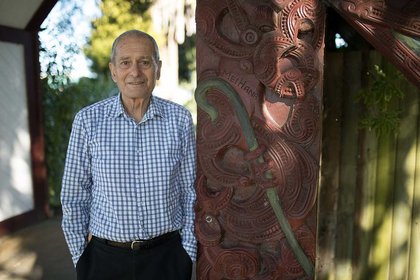
Professor Emeritus Sir Mason Duri. (Photo credit Brendan O'Hagan).
Professor Emeritus Sir Mason Durie has been recognised with an award that acknowledges Māori academic leaders with a history of bringing about major social change and impact in Aotearoa New Zealand.
Sir Mason, of Rangitane, Ngāti Raukawa and Ngāti Kauwhata, has been selected as one of three inaugural Ruānuku by Ngā Pae o te Māramatanga, New Zealand's Māori Centre of Research Excellence, which is hosted by the University of Auckland and funded by the Tertiary Education Commission. The others are Sir Tīpene O’Regan, of Ngai Tahu, and Ngahuia Te Awekotuku, of Ngai Tahu.
Ruānuku deliver wisdom and knowledge and each will be providing insight, guidance and mana to the direction and mission of the centre and inspiring the next generation of Māori scholars and leaders.
Sir Mason, a respected academic and contributor to public health, Māori and mental health-related knowledge, was knighted in 2010 for his services to public and Māori health. He retired as Deputy Vice-Chancellor of Massey in 2012 but has remained closely involved.
During his career, he was appointed professor and head of what is now Te Pūtahi-ā-Toi, the School of Māori Knowledge, in 1988, chair of Māori Research and Development in 2002, and Deputy Vice-Chancellor in 2009.
He held the role of Assistant Vice-Chancellor Māori and Pasifika and his academic portfolio of Professor of Māori Research and Development until he retired, at which time he was conferred with the title of Professor Emeritus. In 2017, Sir Mason was awarded the Blake Medal, the premium award for leadership in New Zealand.
Among his many successes in fostering Māori-focused health education, research and training, he was successful in gaining funding to establish a Centre for Māori Health Research, Te Pūmanawa Hauora, and also negotiated the Māori mental health programme, Te Rau Puawai, which provides up to 100 scholarships a year for students studying health-related subjects.
Massey researchers contributing to Ngā Pae include Distinguished Professor Hingangaroa Smith, Professor Huia Jahnke, Dr Farah Palmer, Dr Matt Roskruge, Dr Natasha Tassell-Matamua, Dr Simon Hills and Veronica Tawhai.